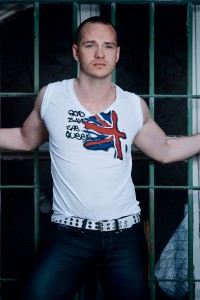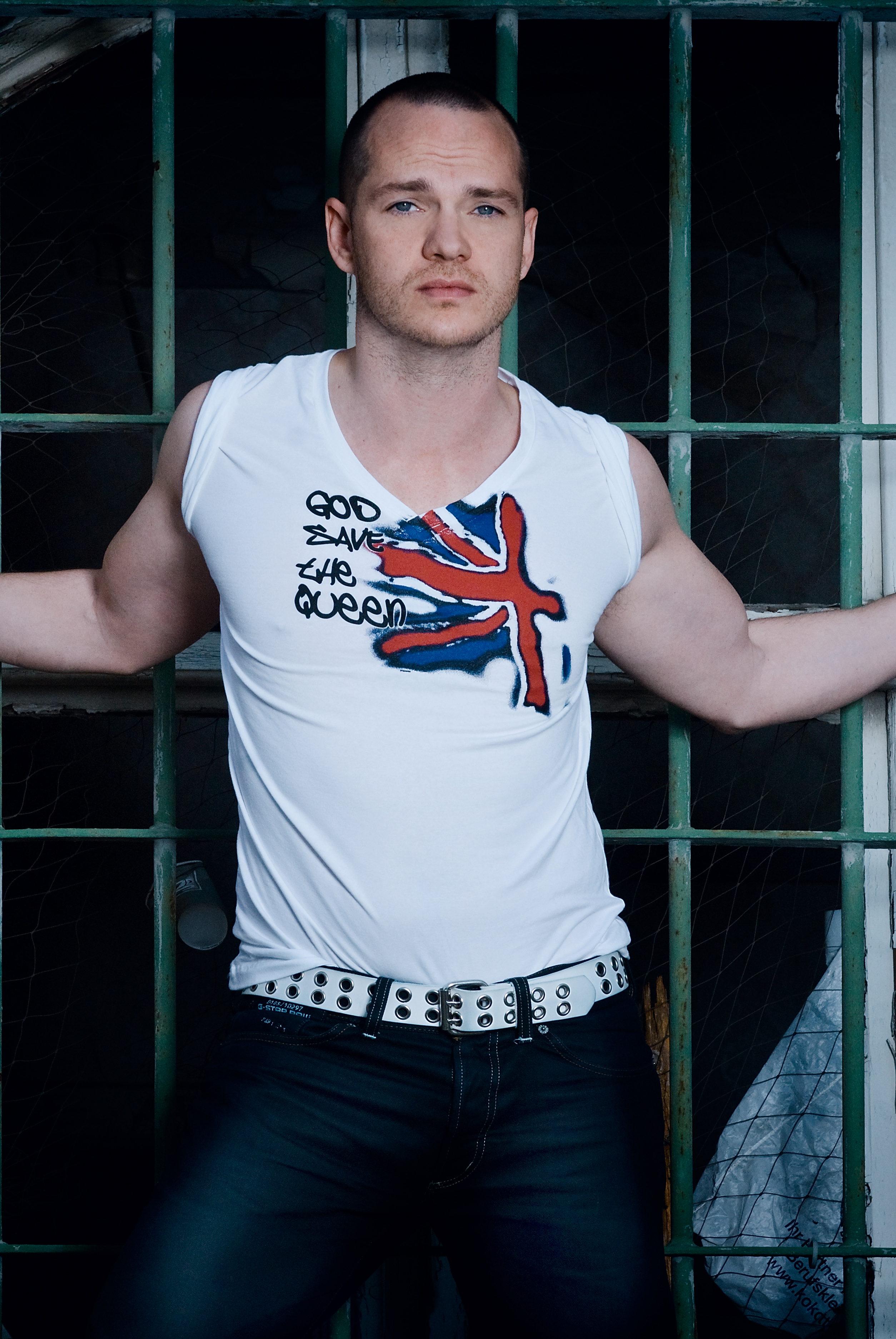IN THE TV SERIES Queer as Folk, Emmett Honeycutt was everyone’s favorite Southern queen a decade ago. He was portrayed by Peter Paige, a multi-talented actor, writer, and producer. In a more recent incarnation, Paige is co-creator of the groundbreaking drama The Fosters, which has aired on ABC Family on Monday nights since June 2013. The show, a production of Jennifer Lopez’  JLE company, features a biracial lesbian couple who have quite a diverse household: a biological child, an adopted set of twins (boy and girl, Mexican-American), and a set of foster siblings.
JLE company, features a biracial lesbian couple who have quite a diverse household: a biological child, an adopted set of twins (boy and girl, Mexican-American), and a set of foster siblings.
I sat down with Mr. Paige on a rare quiet morning for him in his Los Angeles apartment to talk about his career and his new hit show.
Chris Freeman: Let’s go back to Queer as Folk, which put you on the “gay map.”
Peter Paige: I started auditioning for that show in spring of 2000. Before that, I had been classically trained as a theater actor at Boston University. After graduation, I went to New York. I was a New York actor, but there were ten thousand versions of me there. I did a lot of low-pay/no-pay stuff for three years. I loved New York, but my career didn’t ever really take off. New York broke my spirit a little. I really wasn’t ready to take L.A. by storm at that point either.
CF: So what did you do?
PP: A woman I went to school with was living in Portland, Oregon. She said I should come out there and perhaps start a theater company. I did some Equity work in Portland, got my union card there, and it was a small enough market that I got noticed. I needed to work—I needed the reinforcement that I could be an actor, and Portland gave me that. One night, an L.A.-based manager saw me doing a play in a tiny theater. He came backstage and told me that I should be in L.A. After some checking around, I decided to make the move, which I did in 1997.
CF: How did that go?
PP: My first audition was for a very good part on Suddenly, Susan—and I booked it. I was working with Swoozie Kurtz and Brooke Shields! I cried for four hours when I got that job. But it was tough for a couple of years. I came in second for so many roles, but my friends kept encouraging me.
CF: Much of your profession is about keeping the faith.
PP: Many of the best actors I’ve known have quit the business. I had to learn tenacity—it never came naturally to me. And of course I needed some luck. One day at the gym, a casting director I know came up to me and said, “Showtime just bought Queer as Folk.” I knew about the British version of the show, but I’d never seen it. I called my manager and he was on it. I was in the first day of pre-reads and the first day of casting. Daniel Lipman and Ron Cowen, the creators/producers, were so encouraging to me. I read for Ted, who has a much richer emotional life, a darker story in the pilot. My gut told me that I wasn’t Ted. What was special about me wasn’t my self-loathing. But Emmett—here was an effeminate gay man who didn’t hate himself. It was revelatory for me personally. My power in playing that character came from that place: I understood him completely. In the first day of casting, I read for Ted. And then I said, “Can I read for Emmett?” The casting director let me—and she asked me, “Which role would you like to come back for?” I put all my joy on the table to create Emmett, and they saw that in me.
CF: How does it feel different for you doing a “gay” show now than it did a decade ago?
PP: Then, many agencies would not submit their clients for Queer as Folk. They prepped Showtime for bomb threats the week we premiered. And now The Fosters has just won a Teen Choice Award. That shows how much the world has changed.
CF: You’ve been able to keep working, despite being known as a “gay actor.” So that might suggest that the business has evolved.
PP: Yes, I think so. A few days before everything got started with Queer as Folk, my manager called. He had received a twenty-page “nudity rider” addendum to my contract. He advised me against taking the job. I said I wanted to sleep on it. Ultimately, I knew that if the show happened, I wanted to do it. I didn’t want someone else doing that job. It was not bad advice from my agent, but by 2005, that attitude seems to have changed, and our show was part of that change. Of course, with any role on TV, there are challenges. You get type-cast. You spend years, every week, reinforcing one idea about yourself. It is a joy, it’s a family, a great job, and an amazing ride. But I knew that I wanted to do something else—more storytelling, and I found a writing partner, Bradley Bredeweg. None of this would have happened without him.
CF: Where did The Fosters come from?
PP: Brad and I went looking for a story. We thought about what was on TV and what we’d like to watch. At the time, there were almost no “family dramas” on—Shameless was on HBO, Parenthood on ABC, and basically nothing else. So we decided to go in that direction—but to base it on a different kind of family.
CF: You’re on the board of the L.A. Gay and Lesbian Center. How did that factor into The Fosters?
PP: In terms of “family drama,” we knew we wanted to do an alternative family. Modern Family was doing gay dads, as was The New Normal. But we realized that a show had not been done around gay moms. Every lesbian couple I know either has kids, is having kids, or is talking about it. So the next question was, “how did they create their family?” So we started building it, and at about that time, the Center got a grant from the Obama administration to develop the nation’s first-ever protocol for lgbtq youth in foster care. I was learning about all this—how it succeeds and fails—and I was so moved by it. There are 400,000 kids in the U.S. in the foster system. It’s heartbreaking. It’s never been featured on TV—at least not in this way—so we thought it would be compelling.
CF: A recent, favorable review in The New Yorker said that your show explores “more sophisticated themes” than Downton Abbey. To me, your show is about the complications of contemporary lives.
PP: That’s how we sold it to Jennifer Lopez.
CF: What’s the story there?
PP: We got a call from her head of development, with whom we had worked at a different company. He said they were looking for some quality scripted shows. We knew that The Fosters needed a big megaphone to make it happen, so we pitched it, and they loved it. Jennifer was not at the first meeting. They said, “We love it, but why us?” And I said, “Jennifer Lopez is the world’s first multi-cultural superstar, and our show is about the new multi-cultural family.” They loved that—I’m so glad that I came up with that answer!
CF: How is she to work with?
PP: She’s smart as a whip and one of the hardest-working people I know. With our show, she was totally on board right away.
CF: I’d love to see a cameo by J.Lo! But you do have Rosie O’Donnell on the show—how did that happen?
PP: Rosie had been on Queer as Folk, so I knew her. She’s a fan of The Fosters and tweeted me about it. I thanked her, and she sent me a private message and told me she’d be happy to come on the show. We had written to Rita, the head of Girls United, a group home, and it was perfect for Rosie. I think it’s some of the best work she’s done. I love the world of Girls United, and we have made some webisodes. To give these forgotten, invisible girls a voice moves me tremendously.
CF: What are some of the challenges of making The Fosters happen?
PP: I have to think on my feet and problem-solve all the time. It’s a lot of global thinking, and that’s what I missed as an actor. It’s challenging and thrilling. Collaboration is the key element of being a show-runner. It takes a hundred people to make this show—a big part of my job is empowering them to do the best job they can.
CF: Like Queer as Folk, The Fosters is an ensemble cast. How has that helped you understand and work with that kind of format?
PP: As a member of an ensemble, you’re very much aware that you are one part of the whole. I learned the rhythms of the ensemble process. I came to understand the disappointment of having a small role on a particular episode. I have a lot of empathy for my cast because of that experience. I make a serious effort to give significant stories to all eight of our leads, as well as to those people who surround them. I want their stories to matter, regardless of whether they’re “major” or “minor” characters.
CF: How has the rise of the social media affected the new show? Facebook started at about the time Queer as Folk ended.
PP: It’s a whole new world. The Fosters was one of TV’s ten most talked-about shows in social media in January when we came back on the air. I love watching the comments on Twitter when the show’s on. I feel like the playwright at the back of the theater. This kind of social media presence gets the attention of sponsors. We’ve done product placement on the show—it’s challenging because you have to work vendors into your show. On the other hand, the fact that Toyota or Kindle wants to be part of a show about an interracial lesbian couple says a lot about how things have changed in our culture.
CF: On that note, what can you say about any positive or negative things that have happened on the business end of things, given the queerness of the show?
PP: I think people were anticipating some problems—they thought it sounded like a great show, but how were we going to sell it? When Jennifer Lopez got interested, that changed things. The network loved the pilot; it had come to the top of the pile. One of the executives said, “I love it, but I don’t know what the hook is.” Someone responded, “The hook is that there are two moms.” Everyone immediately saw that—so its queerness has been every bit as useful as it has been challenging. As with Queer as Folk, what made it exciting is what made it successful: people came for the queer and stayed for the folk. With The Fosters, it is the same—they come for the family and stay for the drama. They recognize their own lives there. I think the most powerful, subversive thing we can do is to keep this show on the air.
Chris Freeman, who teaches English and gender studies at USC, is co-editor of a forthcoming book of essays, The American Isherwood.






Discussion1 Comment
Great interview about a great show! I hope it stays on for years to come.